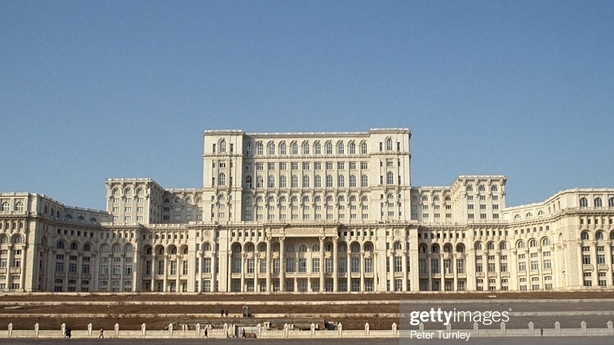It's not that I know where every cup and saucer comes from but when I reach into the press for a small blue ceramic cup I can’t help thinking of how it ended up there.
16 years ago the cup came back with me from a trip to Romania. I spent a few days in the capital, Bucharest. It’s a city with many idiosyncracies -- apart from being overrun by stray dogs at the time it has no major river. The architecture bears a strong French influence although a major earthquake in 1977 saw much of the centre rebuilt under the watchful eye of Communist dictator Nikolai Ceaucescu.
It was not the only legacy the apprentice shoemaker left behind. Ceaucescu's ambition to make Romania a world power involved a population drive that infamously filled orphanages with abandoned babies. The country’s oil industry kept foreign debt in check but domestic spending tilted the state into long-term bankruptcy.
And looming over Bucharest his pet project, the Presidential Palace, listed after the Pentagon as the second largest building in the world. And even with construction teams working around the clock it took 13 years to build, entire neighbourhoods flattened to make room for it.
A salute to excess and vanity,

It was not the only legacy the apprentice shoemaker left behind. Ceaucescu’s ambition to make Romania a world power involved a population drive that infamously filled orphanages with abandoned babies. The country’s oil industry kept foreign debt in check but domestic spending tilted the state into long-term bankruptcy.
Following their execution Elena and Nicolae were buried separately, a modest, almost anonymous, plot marked with the Communist star and inscribed: "A tear on your tomb from the Romanian people."
On a sweltering hot day I approached a kindly old gravedigger at the Ghencea cemetery to find their final resting place.
Doors opened at the cemetery chapel.
I noticed one of the mourners carried three yellow plastic duty-free bags. It turned out the deceased was her father. The niece introduced us.
"Please, you will have food and drink to celebrate this day," said the daughter, giving me a bag. The niece explained that food and drink was to symbolise body and blood. Somewhat mystified, I accepted and thanked her. The family would commemorate this day for the next seven years after which they would be satisfied that Dimitriu Barbu was in heaven.
She smiled for the first time.
The crowd began to thin out so I went to the grave and lit the candle, then took a bus back to the city centre wondering what was in the bag. Ceaucescu had cleared another part of town to make way for Piata Unirii, a Parisian style boulevard and park, It was now overgrown and full of weeds. With the sun beating down I found a bench in the shade. I opened the bag to find a generous picnic of bread, chicken, salami, cheese, tomatoes, olives, fruit and cake all lovingly wrapped, complete with cutlery - and a blue ceramic cup.
Communion for one. A feast for the soul.
